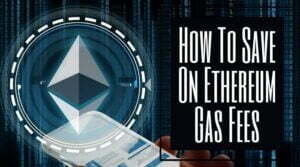Need some help learning how to save on Ethereum gas fees? There are several approaches you can use individually or together to reduce those costs of doing business when you buy, sell, or trade Ethereum.
 What Are Ethereum Gas Fees?
What Are Ethereum Gas Fees?
Gas fees are the cost of doing business on the Ethereum network, when you buy, sell, or trade crypto, NFTs, etc. you will incur these fees.
The fees are basically paid whenever you perform an act on the network such as trading in DeFi, creating or selling NFT artwork, or using smart contracts. Gas fees not only support the network, they are also helpful for cutting down spam and misuse of the network.
It helps to think of gas fees as a cost of doing business similar to the listing fees required by Etsy–every time you list a new item for sale in an Etsy shop, there is a fee that must be paid in addition to any commissions required by Etsy for making a sale.
Where Ethereum gas fees are calculated, they are measured in “gwei” which is the unit of measure used for gas. If you hear talk about gas fees being a specific number, as in, “I paid 200 for my gas fees,” they are referring to 200 gwei which must be purchased according to the rules of the network.
There is a limit to how much gas can be used for a single block in the network and there is a cap on how much gas can be used for any single activity.
Gas fees are subject to change due to a variety of factors including demand–that can complicate things for some users, and it forces some to seek out ways to save money on Ethereum gas fees.
There are other complicating factors, but for the purpose of this article the simple approach is best–you’ll learn about network demand and how it affects gas prices as you go, but it pays to know some money-saving tips ahead of your investment or purchase.
The gas fee issue for Ethereum may not last forever, especially since this currency is the focus of much discussion about plans to change Ethereum to a proof-of-burn rather than proof-of-work model in 2022.
Saving Money On Ethereum Gas Fees
One way to save money on gas fees is to time your transactions; trading during the week places higher demand on the network and hence may increase gas fees.
Trade during off-peak times such as the weekend. It’s safe to assume that regular business hours/normal trading hours (such as between 8 AM and 2 PM) will represent more demand and conversely higher gas fees.
Another option is to obtain gas tokens strategically–as in, when gas prices are lower–and hang onto them until the time is right to use those tokens when gas prices are less investor-friendly.
Redeeming gas tokens when prices rise means you get a refund to cover those expenses. Investor beware, though, because when Ethereum begins moving in earnest to a proof-of-stake model instead of proof-of-work, this option’s days are numbered.
Gas Minimization Apps
Third-party apps may help you save money on gas fees by automating and batch-processing tasks which potentially lowers demand and price on gas.
There are multiple options offered to help in this area but you’ll need to do your homework and determine if this is truly a viable option for you–it may work better for some investors who are part of a group and want to run all their transactions in this manner. Paying gas fees in a batch may work out better for investors who anticipate such volume that a group processing option makes sense.
A similar fee reduction option for some? Gas rebates. Some platforms may offer you a gas fee rebate for trading on that platform or as a reward for some other form of participation on the network. At press time, we Googled this option and got results based on one platform called ShapeShift offering a gas rebate after making approved DEX trades within a certain timeframe.
A “Practice” App?
If you are an inexperienced trader, gas fees may seem a bit daunting–how do you learn the ropes without paying out the nose for these fees?
One option is an app called DeFi Saver, which allows you to simulate Ethereum transactions without actually having to make a real-world spend while you are learning. The simulations allow you to experiment with any type of transaction you are allowed to do on the network and you have zero risk of loss when doing so.
Being able to use an app to practice with can help you save money indirectly on gas fees by making your first real-world transactions happen without false starts, mistakes, etc. You won’t save money directly using an app like this, but you will save time and prevent potentially costly mistakes when you do use the network for real.
Joe Wallace has covered real estate and financial topics, including crypto and NFTs since 1995. His work has appeared on Veteran.com, The Pentagon Channel, ABC and many print and online publications. Joe is a 13-year veteran of the United States Air Force and a former reporter for Air Force Television News.

 What Are Ethereum Gas Fees?
What Are Ethereum Gas Fees?
